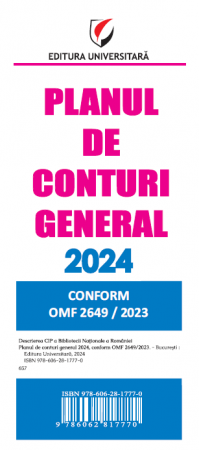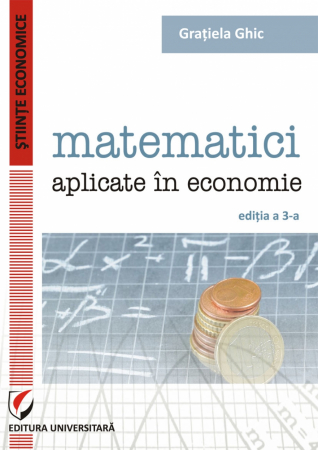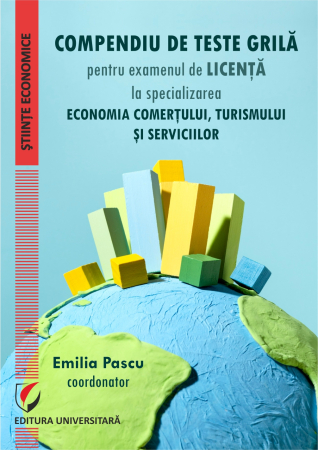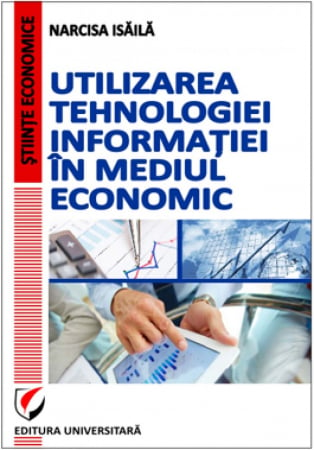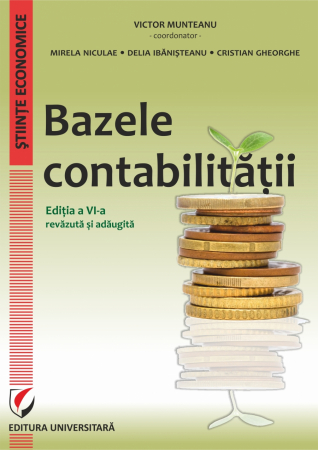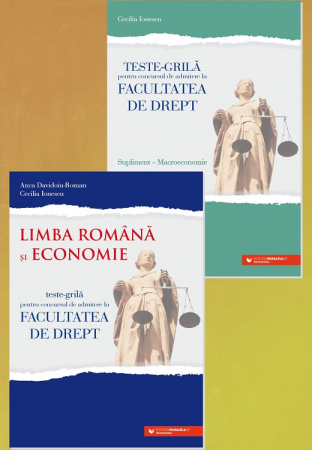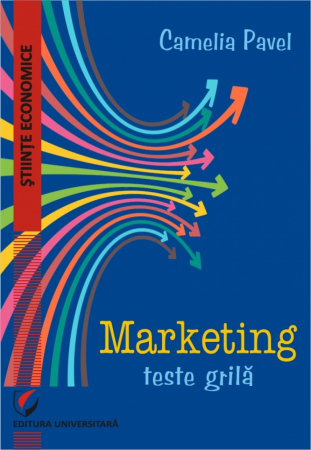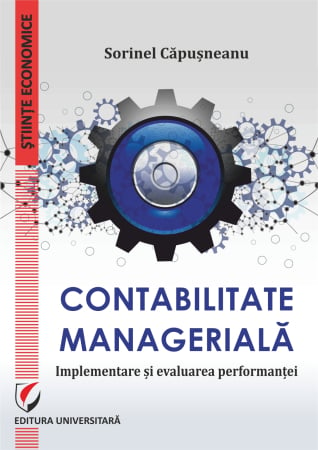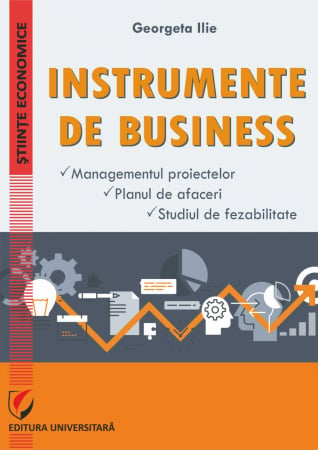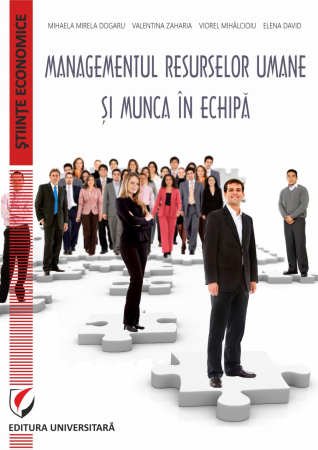Manuscript proposals: [email protected] / 0745 204 115 //// Tracking orders Individuals / Sales: 0745 200 357 / Orders Legal entities: 0721 722 783
6359.png) Educated Eng. The education of the future - postmodern perspectives, in an economic vision - Irina Ion
Educated Eng. The education of the future - postmodern perspectives, in an economic vision - Irina Ion
6359.png)
Publisher: Editura Universitară
Author: Irina Ion
ISBN: 978-606-28-0619-4
DOI: 10.5682/9786062806194
Publisher year: 2017
Pages: 270
Product Code:
9786062806194
Do you need help?
0745 200 357
- Description
- Download (1)
- Authors
- Content
- More details
- Reviews (0)
The main purpose of Educat-ing is to provide scientific arguments about the importance of education in contemporary society, in order for them to substantiate educational decisions and policies and to inspire school leaders and teachers, towards an educational leadership adapted to the third millennium.
The second objective is to show that current education systems are, in many respects, anachronistic, and that they need to be rethought, in line with the new imperatives of work and the knowledge economy. Without claiming to develop an absolutely functional and reformed model, however, the book launches a series of ideas about the principles on which a postmodern education system should be based.
In an attempt to achieve these goals, Educat-ing asks questions, which it tries to answer, even partially, such as: are we ready at school to make the best choices for life? Does contemporary education help us manage the complexity of the present and the future, or is our vision still one-way and our weapons anachronistic and rudimentary? Does the education we receive at school, including college, help us be happier? How do we define happiness? Does education protect us from the danger denounced by Maria Dumitrescu (2016), namely that "post-modern man fails to establish his existence, because he is obsessed with the image of being flawless, eternally happy"? How much does the salary increase if I have college? Is it worth going to college?
Educat-ing is developed in the form of an eclectic collection of ideas and theories about education, organized in three parts, namely Part I Where are we ?, Part II Education, the holy milking cow of mankind and Part III Principles of postmodern education.
Part I represents a historical foray into the development of education systems, which illustrate how they have been able, throughout history, to create a certain social order, being the basis of social systems that shape human existence. Part I concludes with an analysis of contemporary education, which is, and needs to be, postmodern. A model of postmodern education is outlined in this chapter, based on five principles, approached, in fact, in five distinct chapters of the book, which form Part III, namely:
• Functional flexibility and professional mobility of human resources
• Entrepreneurial skills and creativity developed at school
• Education of moral values and non-cognitive skills
• Family integration in the approach to education
• Education, justice and social cohesion in the age of globalization
The five principles overlap as an area of action, to a certain extent, which facilitates the design of an updated, postmodern model of education, adapted to the 21st century. The model has a strong constructivist approach, through the vision and methods promoted. These principles are meant to satisfy the interests of broadly defined stakeholders, namely: the teaching staff, educational management teams, educational policy makers, families, young people and economic agents. A fundamental education reform is not possible without aligning the interests and actions of all these education stakeholders.
Part II of the book theoretically substantiates the appreciation of the great Hungarian scientist Albert Szent Gyorgy, a Hungarian biochemist who won the Nobel Prize in Medicine in 1937, namely that education, along with scientific research, is a "holy milking cow" of mankind. Part II of the book makes a foray into multiple scientific research that support the benefits of education, monetary and non-monetary.
Part III of the book analyzes in detail the five proposed principles of education, offering both scientific arguments and practical approaches, in support of the implementation of these principles.
The whole volume is a pro-education manifesto, young people and families, which we hope will inspire the bringing of a new breath to the educational system, by the stakeholders permanently concerned with Educat-ing.
The second objective is to show that current education systems are, in many respects, anachronistic, and that they need to be rethought, in line with the new imperatives of work and the knowledge economy. Without claiming to develop an absolutely functional and reformed model, however, the book launches a series of ideas about the principles on which a postmodern education system should be based.
In an attempt to achieve these goals, Educat-ing asks questions, which it tries to answer, even partially, such as: are we ready at school to make the best choices for life? Does contemporary education help us manage the complexity of the present and the future, or is our vision still one-way and our weapons anachronistic and rudimentary? Does the education we receive at school, including college, help us be happier? How do we define happiness? Does education protect us from the danger denounced by Maria Dumitrescu (2016), namely that "post-modern man fails to establish his existence, because he is obsessed with the image of being flawless, eternally happy"? How much does the salary increase if I have college? Is it worth going to college?
Educat-ing is developed in the form of an eclectic collection of ideas and theories about education, organized in three parts, namely Part I Where are we ?, Part II Education, the holy milking cow of mankind and Part III Principles of postmodern education.
Part I represents a historical foray into the development of education systems, which illustrate how they have been able, throughout history, to create a certain social order, being the basis of social systems that shape human existence. Part I concludes with an analysis of contemporary education, which is, and needs to be, postmodern. A model of postmodern education is outlined in this chapter, based on five principles, approached, in fact, in five distinct chapters of the book, which form Part III, namely:
• Functional flexibility and professional mobility of human resources
• Entrepreneurial skills and creativity developed at school
• Education of moral values and non-cognitive skills
• Family integration in the approach to education
• Education, justice and social cohesion in the age of globalization
The five principles overlap as an area of action, to a certain extent, which facilitates the design of an updated, postmodern model of education, adapted to the 21st century. The model has a strong constructivist approach, through the vision and methods promoted. These principles are meant to satisfy the interests of broadly defined stakeholders, namely: the teaching staff, educational management teams, educational policy makers, families, young people and economic agents. A fundamental education reform is not possible without aligning the interests and actions of all these education stakeholders.
Part II of the book theoretically substantiates the appreciation of the great Hungarian scientist Albert Szent Gyorgy, a Hungarian biochemist who won the Nobel Prize in Medicine in 1937, namely that education, along with scientific research, is a "holy milking cow" of mankind. Part II of the book makes a foray into multiple scientific research that support the benefits of education, monetary and non-monetary.
Part III of the book analyzes in detail the five proposed principles of education, offering both scientific arguments and practical approaches, in support of the implementation of these principles.
The whole volume is a pro-education manifesto, young people and families, which we hope will inspire the bringing of a new breath to the educational system, by the stakeholders permanently concerned with Educat-ing.
-
EDUCAT- ING. Educatia viitorului – perspective postmoderne, in viziune economica
Download
IRINA ION
Why we need to rethink the educational paradigm / 9
PART I
WHERE WE ARE? / 17
Chapter 1. Education - the origin of social systems / 19
Chapter 2. Modern education, the (neo) liberal advance and the knowledge society / 40
Chapter 3. Postmodern education / 61
PART II
EDUCATION - THE HOLY MILK COW OF HUMANITY / 83
Chapter 4. Economics of education / 85
Chapter 5. Non-market earnings / 105
PART III
PRINCIPLES OF POST-MODERN EDUCATION / 123
Chapter 6. Principle 1: Functional flexibility and professional mobility / 125
Chapter 7. Principle 2: Entrepreneurial skills and creativity / 158
Chapter 8. Principle 3: Education of moral values and non-cognitive abilities / 191
Chapter 9. Principle 4: Family integration in the approach to education / 209
Principle 10: Education, justice and social cohesion in the age of globalization / 224
Implications for teachers, public policy makers and parents / 249
Bibliography / 254
PART I
WHERE WE ARE? / 17
Chapter 1. Education - the origin of social systems / 19
Chapter 2. Modern education, the (neo) liberal advance and the knowledge society / 40
Chapter 3. Postmodern education / 61
PART II
EDUCATION - THE HOLY MILK COW OF HUMANITY / 83
Chapter 4. Economics of education / 85
Chapter 5. Non-market earnings / 105
PART III
PRINCIPLES OF POST-MODERN EDUCATION / 123
Chapter 6. Principle 1: Functional flexibility and professional mobility / 125
Chapter 7. Principle 2: Entrepreneurial skills and creativity / 158
Chapter 8. Principle 3: Education of moral values and non-cognitive abilities / 191
Chapter 9. Principle 4: Family integration in the approach to education / 209
Principle 10: Education, justice and social cohesion in the age of globalization / 224
Implications for teachers, public policy makers and parents / 249
Bibliography / 254
In the relativism and complexity of the times we live in today, it is becoming increasingly difficult to make value judgments or normative statements about what is good and what is bad, about what should or should not be done. We have learned to adopt multiple perspectives, to digitize ourselves, to be tolerant and flexible, to embrace uncertainty and, in addition, to do all these things at an amazingly high speed. As Marina Dumitrescu said in her book "How (should) we age?":
"We are the generation of accelerated history, of cosmic flights, of the atomic age, of microchips, of computing, of globalization and of the Internet: a generation (...) that is witnessing (...) the most dramatic strain of human time: it has never happened , in such a short time, such a large amount of profound qualitative changes, resulting not only from the socio-economic impact of new technologies, but also from the total dissolution of the traditional Sofia in a cold, corporate, anonymous scientific bubble , transhuman, which commands profit and pushes the world towards I don't know what ”(Dumitrescu, 2016).
Pluralism and diversity in ideologies, the multiplication of existential questions and social actors, cultural relativism, the fragmentation and massive diversification of points of view outline a new perspective on human life and condition, marked by a clear increase in complexity. Managing this complexity does not force us in any way to accept that everything is just a matter of opinion, but on the contrary, it should urge us to be able to seek the truth, given its historical and social context (Lees, 2007). Changes in perspective, but also of the human condition itself are now being discussed as part of a post-modern, late modern or "liquid" period (Dholakia, 2000, Fırat, 1991).
In the context of postmodernity, in which most of the structures of human and institutional existence are reconfigured, the question arises to what extent education, as a social system, responds to these structural transformations of a new individual and societal lifestyle.
Numerous factors call into question the need for a paradigm shift in the way education is approached in national policies, but also in educational institutions, families and the media.
Examples of such factors are the multiplication of stakeholders in education, each wanting to impose their preferences and expectations, decentralization and flexibility of education systems, the profound impact of globalization on national policies, socio-demographic changes or technological progress.
Another main factor is the opening of education, especially higher education, to the entire population, by establishing mass education, especially higher education. This has changed the benefits traditionally associated with education. Education, not even higher education, is no longer a guarantee of high social status or high incomes, but rather a minimum condition for access to certain professions. This, among others, has fueled a widespread social critique of the education system, to which the trust placed in certain stakeholders has declined. Parents are disappointed with the contribution of education to their children's future, and governments or the media blame the education system for failing to provide promised social progress or equality.
Most of the time, teachers were considered the main culprits for the problems of the system, forgetting that in fact, teachers are emanations of the educational system, which has to face many social, demographic, economic, technological and cultural transformations. Teachers are, in fact, responsible for a certain evolution of society that has imposed fundamental changes in terms of their own role. In the context of the transition from an elite education system to a mass education system, the role of the teacher has changed. Factors such as increased heterogeneity of students, due to compulsory education, but also the multiplication and diversification of conflicts and social tensions in different communities, democratization of huge access to information or change of educational programs, misled many teachers and made them insecure regarding the things they have to do to adapt and reform. Most of the time, in this context, teachers are exposed to situations whose management involves the expansion of their fundamental obligations, which has created stress and over-demand (Esteve, 2000).
All this leads to the increase of the complexity of the education systems, but also of their societal responsibilities, in a contemporary society which is, to a certain extent, a true capitalism of grades. The contemporary institution of the school has acquired new functions and responsibilities. If in the past the role of schools was mostly related to educational excellence, more and more schools are now preparing children in a holistic form, the role of the school extending beyond the creation of academic skills, involving the training of skills such as personal management, career management, development of emotional intelligence, integration into the labor market, development of creativity and preparation for entrepreneurship.
These changes make the management and approach of education more complicated not only for teachers, but also for young people, parents, managers of schools and governments.
As for governments, sometimes their response is either oversized, for example, by imposing overwhelming standard tests on students and teachers, or by increasing bureaucracy, or undersized, mainly by large-scale practice. decentralization or privatization processes, which hides the idea of a cheaper and less costly political strategy. For many countries, the optimal level of educational expenditure is still an open question (Busemeyer, Trampusch, 2011), especially due to the redistributive effect of these expenditures, especially for higher education. All this takes place in the context of globalization, which creates a universal model of education and at the same time tends, at least in some countries, to a renunciation of the social goals of cohesion and solidarity, traditionally pursued by governments. Thus, in the relationship between political system and education, new questions arise, such as the role of knowledge in governing complex education systems or, conversely, what is the new role of government in creating knowledge, but also in developing and implementing educational policies.
Current academic concerns for the analysis of educational systems are well developed, but there are also some disadvantages.
First, as the well-known education specialist Alfie Kohn (2015) points out, with reference to parenting literature in particular, which is closely related to that of education, there is a discouraging uniformity of work on children and their upbringing. This indicates questionable value systems that fuel education, and in general, contemporary societies. Moreover, Kohn (2015) reaches an alarming conclusion, namely that in our society we have not yet learned to love children. Although this seems like a very radical statement, I think we should take the time to understand if this is not the case.
Second, studies that analyze educational systems often focus on specific aspects of their functioning, and less on providing a holistic analysis. Thus, there is a lack of systematic evaluations of the way in which the institutional factors interact with the individual ones in obtaining educational results or analyzes that include all the stakeholders of education: young people, families, school, governments, companies. Other fragments of the current analyzes are given by the fact that often the approaches with a pronounced didactic character do not take into account the economic analysis or aspects related to the educational management. Similarly, there is little effort to bring together at least some of the externalities of education. In the literature focused on education, multidisciplinary approaches are rare, thus omitting the link between education and social and economic policies.
Although education, within the school and the family, is the basis of individual and societal visions, there is no discussion of a world order of education and there are no clear theories to explain the great economic, social and moral crises, such as wars, terrorism, inequalities, certain diseases, in terms of education (Lynn, 2000), despite obvious links.
In this context, which emphasizes a great need to analyze and change education in line with the challenges of postmodern society, we considered that a book on education can be welcomed for many societal actors, starting with teachers, school leaders, decision, but also parents who want to better understand how the educational system works in the new economy.
The main purpose of Educat-ing is to provide scientific arguments about the importance of education in contemporary society, in order for them to substantiate educational decisions and policies and to inspire school leaders and teachers, towards an educational leadership adapted to the third millennium.
The second objective is to show that current education systems are, in many respects, anachronistic, and that they need to be rethought, in line with the new imperatives of work and the knowledge economy. Without claiming to develop an absolutely functional and reformed model, however, the book launches a series of ideas about the principles on which a postmodern education system should be based.
In an attempt to achieve these goals, Educat-ing asks questions, which it tries to answer, even partially, such as: are we ready at school to make the best choices for life? Does contemporary education help us manage the complexity of the present and the future, or is our vision still one-way and our weapons anachronistic and rudimentary? Does the education we receive at school, including college, help us be happier? How do we define happiness? Does education protect us from the danger denounced by Maria Dumitrescu (2016), namely that "post-modern man fails to establish his existence, because he is obsessed with the image of being flawless, eternally happy"? How much does the salary increase if I have college? Is it worth going to college?
Educat-ing is developed in the form of an eclectic collection of ideas and theories about education, organized in three parts, namely Part I Where are we ?, Part II Education, the holy milking cow of mankind and Part III Principles of postmodern education.
Part I represents a historical foray into the development of education systems, which illustrate how they have been able, throughout history, to create a certain social order, being the basis of social systems that shape human existence. Part I concludes with an analysis of contemporary education, which is, and needs to be, postmodern. A model of postmodern education is outlined in this chapter, based on five principles, approached, in fact, in five distinct chapters of the book, which form Part III, namely:
• Functional flexibility and professional mobility of human resources
• Entrepreneurial skills and creativity developed at school
• Education of moral values and non-cognitive skills
• Family integration in the approach to education
• Education, justice and social cohesion in the age of globalization
The five principles overlap as an area of action, to a certain extent, which facilitates the design of an updated, postmodern model of education, adapted to the 21st century. The model has a strong constructivist approach, through the vision and methods promoted. These principles are meant to satisfy the interests of broadly defined stakeholders, namely: the teaching staff, educational management teams, educational policy makers, families, young people and economic agents. A fundamental education reform is not possible without aligning the interests and actions of all these education stakeholders.
Part II of the book theoretically substantiates the appreciation of the great Hungarian scientist Albert Szent Gyorgy, a Hungarian biochemist who won the Nobel Prize in Medicine in 1937, namely that education, along with scientific research, is a "holy milking cow" of mankind. Part II of the book makes a foray into multiple scientific research that support the benefits of education, monetary and non-monetary.
Part III of the book analyzes in detail the five proposed principles of education, offering both scientific arguments and practical approaches, in support of the implementation of these principles.
The whole volume is a pro-education manifesto, young people and families, which we hope will inspire the bringing of a new breath to the educational system, by the stakeholders permanently concerned with Educat-ing.
"We are the generation of accelerated history, of cosmic flights, of the atomic age, of microchips, of computing, of globalization and of the Internet: a generation (...) that is witnessing (...) the most dramatic strain of human time: it has never happened , in such a short time, such a large amount of profound qualitative changes, resulting not only from the socio-economic impact of new technologies, but also from the total dissolution of the traditional Sofia in a cold, corporate, anonymous scientific bubble , transhuman, which commands profit and pushes the world towards I don't know what ”(Dumitrescu, 2016).
Pluralism and diversity in ideologies, the multiplication of existential questions and social actors, cultural relativism, the fragmentation and massive diversification of points of view outline a new perspective on human life and condition, marked by a clear increase in complexity. Managing this complexity does not force us in any way to accept that everything is just a matter of opinion, but on the contrary, it should urge us to be able to seek the truth, given its historical and social context (Lees, 2007). Changes in perspective, but also of the human condition itself are now being discussed as part of a post-modern, late modern or "liquid" period (Dholakia, 2000, Fırat, 1991).
In the context of postmodernity, in which most of the structures of human and institutional existence are reconfigured, the question arises to what extent education, as a social system, responds to these structural transformations of a new individual and societal lifestyle.
Numerous factors call into question the need for a paradigm shift in the way education is approached in national policies, but also in educational institutions, families and the media.
Examples of such factors are the multiplication of stakeholders in education, each wanting to impose their preferences and expectations, decentralization and flexibility of education systems, the profound impact of globalization on national policies, socio-demographic changes or technological progress.
Another main factor is the opening of education, especially higher education, to the entire population, by establishing mass education, especially higher education. This has changed the benefits traditionally associated with education. Education, not even higher education, is no longer a guarantee of high social status or high incomes, but rather a minimum condition for access to certain professions. This, among others, has fueled a widespread social critique of the education system, to which the trust placed in certain stakeholders has declined. Parents are disappointed with the contribution of education to their children's future, and governments or the media blame the education system for failing to provide promised social progress or equality.
Most of the time, teachers were considered the main culprits for the problems of the system, forgetting that in fact, teachers are emanations of the educational system, which has to face many social, demographic, economic, technological and cultural transformations. Teachers are, in fact, responsible for a certain evolution of society that has imposed fundamental changes in terms of their own role. In the context of the transition from an elite education system to a mass education system, the role of the teacher has changed. Factors such as increased heterogeneity of students, due to compulsory education, but also the multiplication and diversification of conflicts and social tensions in different communities, democratization of huge access to information or change of educational programs, misled many teachers and made them insecure regarding the things they have to do to adapt and reform. Most of the time, in this context, teachers are exposed to situations whose management involves the expansion of their fundamental obligations, which has created stress and over-demand (Esteve, 2000).
All this leads to the increase of the complexity of the education systems, but also of their societal responsibilities, in a contemporary society which is, to a certain extent, a true capitalism of grades. The contemporary institution of the school has acquired new functions and responsibilities. If in the past the role of schools was mostly related to educational excellence, more and more schools are now preparing children in a holistic form, the role of the school extending beyond the creation of academic skills, involving the training of skills such as personal management, career management, development of emotional intelligence, integration into the labor market, development of creativity and preparation for entrepreneurship.
These changes make the management and approach of education more complicated not only for teachers, but also for young people, parents, managers of schools and governments.
As for governments, sometimes their response is either oversized, for example, by imposing overwhelming standard tests on students and teachers, or by increasing bureaucracy, or undersized, mainly by large-scale practice. decentralization or privatization processes, which hides the idea of a cheaper and less costly political strategy. For many countries, the optimal level of educational expenditure is still an open question (Busemeyer, Trampusch, 2011), especially due to the redistributive effect of these expenditures, especially for higher education. All this takes place in the context of globalization, which creates a universal model of education and at the same time tends, at least in some countries, to a renunciation of the social goals of cohesion and solidarity, traditionally pursued by governments. Thus, in the relationship between political system and education, new questions arise, such as the role of knowledge in governing complex education systems or, conversely, what is the new role of government in creating knowledge, but also in developing and implementing educational policies.
Current academic concerns for the analysis of educational systems are well developed, but there are also some disadvantages.
First, as the well-known education specialist Alfie Kohn (2015) points out, with reference to parenting literature in particular, which is closely related to that of education, there is a discouraging uniformity of work on children and their upbringing. This indicates questionable value systems that fuel education, and in general, contemporary societies. Moreover, Kohn (2015) reaches an alarming conclusion, namely that in our society we have not yet learned to love children. Although this seems like a very radical statement, I think we should take the time to understand if this is not the case.
Second, studies that analyze educational systems often focus on specific aspects of their functioning, and less on providing a holistic analysis. Thus, there is a lack of systematic evaluations of the way in which the institutional factors interact with the individual ones in obtaining educational results or analyzes that include all the stakeholders of education: young people, families, school, governments, companies. Other fragments of the current analyzes are given by the fact that often the approaches with a pronounced didactic character do not take into account the economic analysis or aspects related to the educational management. Similarly, there is little effort to bring together at least some of the externalities of education. In the literature focused on education, multidisciplinary approaches are rare, thus omitting the link between education and social and economic policies.
Although education, within the school and the family, is the basis of individual and societal visions, there is no discussion of a world order of education and there are no clear theories to explain the great economic, social and moral crises, such as wars, terrorism, inequalities, certain diseases, in terms of education (Lynn, 2000), despite obvious links.
In this context, which emphasizes a great need to analyze and change education in line with the challenges of postmodern society, we considered that a book on education can be welcomed for many societal actors, starting with teachers, school leaders, decision, but also parents who want to better understand how the educational system works in the new economy.
The main purpose of Educat-ing is to provide scientific arguments about the importance of education in contemporary society, in order for them to substantiate educational decisions and policies and to inspire school leaders and teachers, towards an educational leadership adapted to the third millennium.
The second objective is to show that current education systems are, in many respects, anachronistic, and that they need to be rethought, in line with the new imperatives of work and the knowledge economy. Without claiming to develop an absolutely functional and reformed model, however, the book launches a series of ideas about the principles on which a postmodern education system should be based.
In an attempt to achieve these goals, Educat-ing asks questions, which it tries to answer, even partially, such as: are we ready at school to make the best choices for life? Does contemporary education help us manage the complexity of the present and the future, or is our vision still one-way and our weapons anachronistic and rudimentary? Does the education we receive at school, including college, help us be happier? How do we define happiness? Does education protect us from the danger denounced by Maria Dumitrescu (2016), namely that "post-modern man fails to establish his existence, because he is obsessed with the image of being flawless, eternally happy"? How much does the salary increase if I have college? Is it worth going to college?
Educat-ing is developed in the form of an eclectic collection of ideas and theories about education, organized in three parts, namely Part I Where are we ?, Part II Education, the holy milking cow of mankind and Part III Principles of postmodern education.
Part I represents a historical foray into the development of education systems, which illustrate how they have been able, throughout history, to create a certain social order, being the basis of social systems that shape human existence. Part I concludes with an analysis of contemporary education, which is, and needs to be, postmodern. A model of postmodern education is outlined in this chapter, based on five principles, approached, in fact, in five distinct chapters of the book, which form Part III, namely:
• Functional flexibility and professional mobility of human resources
• Entrepreneurial skills and creativity developed at school
• Education of moral values and non-cognitive skills
• Family integration in the approach to education
• Education, justice and social cohesion in the age of globalization
The five principles overlap as an area of action, to a certain extent, which facilitates the design of an updated, postmodern model of education, adapted to the 21st century. The model has a strong constructivist approach, through the vision and methods promoted. These principles are meant to satisfy the interests of broadly defined stakeholders, namely: the teaching staff, educational management teams, educational policy makers, families, young people and economic agents. A fundamental education reform is not possible without aligning the interests and actions of all these education stakeholders.
Part II of the book theoretically substantiates the appreciation of the great Hungarian scientist Albert Szent Gyorgy, a Hungarian biochemist who won the Nobel Prize in Medicine in 1937, namely that education, along with scientific research, is a "holy milking cow" of mankind. Part II of the book makes a foray into multiple scientific research that support the benefits of education, monetary and non-monetary.
Part III of the book analyzes in detail the five proposed principles of education, offering both scientific arguments and practical approaches, in support of the implementation of these principles.
The whole volume is a pro-education manifesto, young people and families, which we hope will inspire the bringing of a new breath to the educational system, by the stakeholders permanently concerned with Educat-ing.
If you want to express your opinion about this product you can add a review.
write a review

![Educated Eng. The education of the future - postmodern perspectives, in an economic vision - Irina Ion [1] Educated Eng. The education of the future - postmodern perspectives, in an economic vision - Irina Ion [1]](https://gomagcdn.ro/domains/editurauniversitara.ro/files/product/large/educat-ing-educatia-viitorului-perspective-postmoderne-in-viziune-economica-408-219363.jpg)
